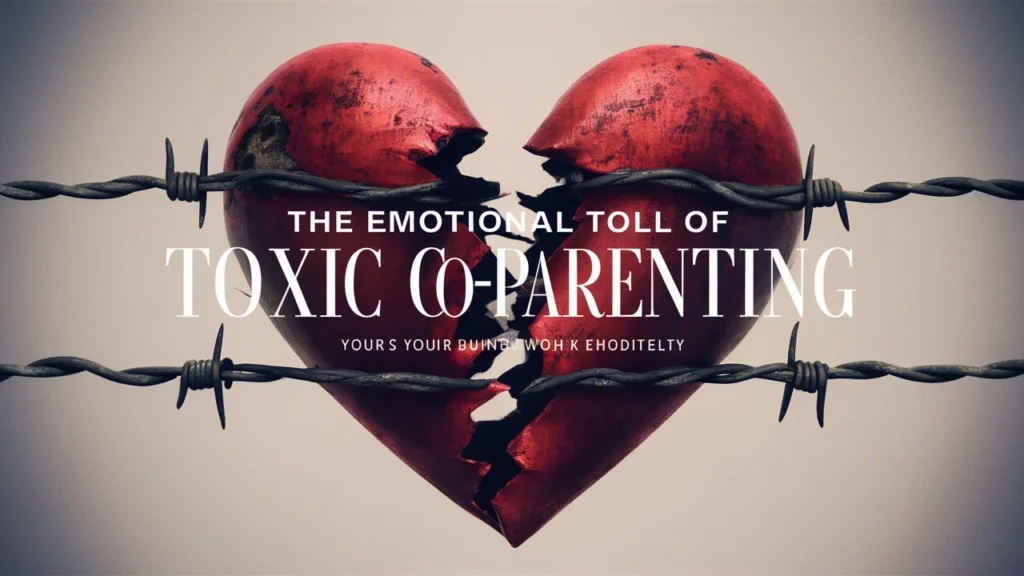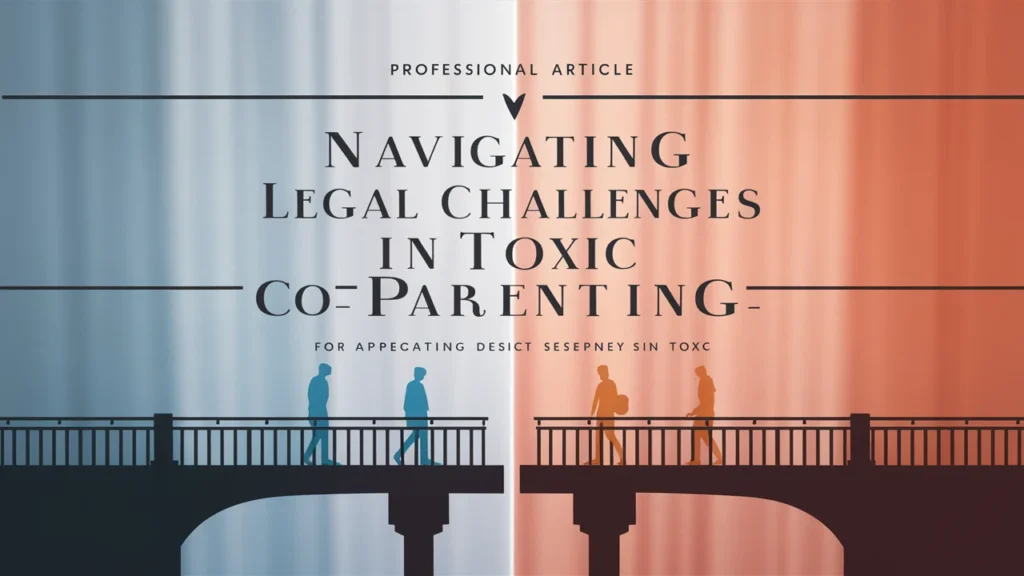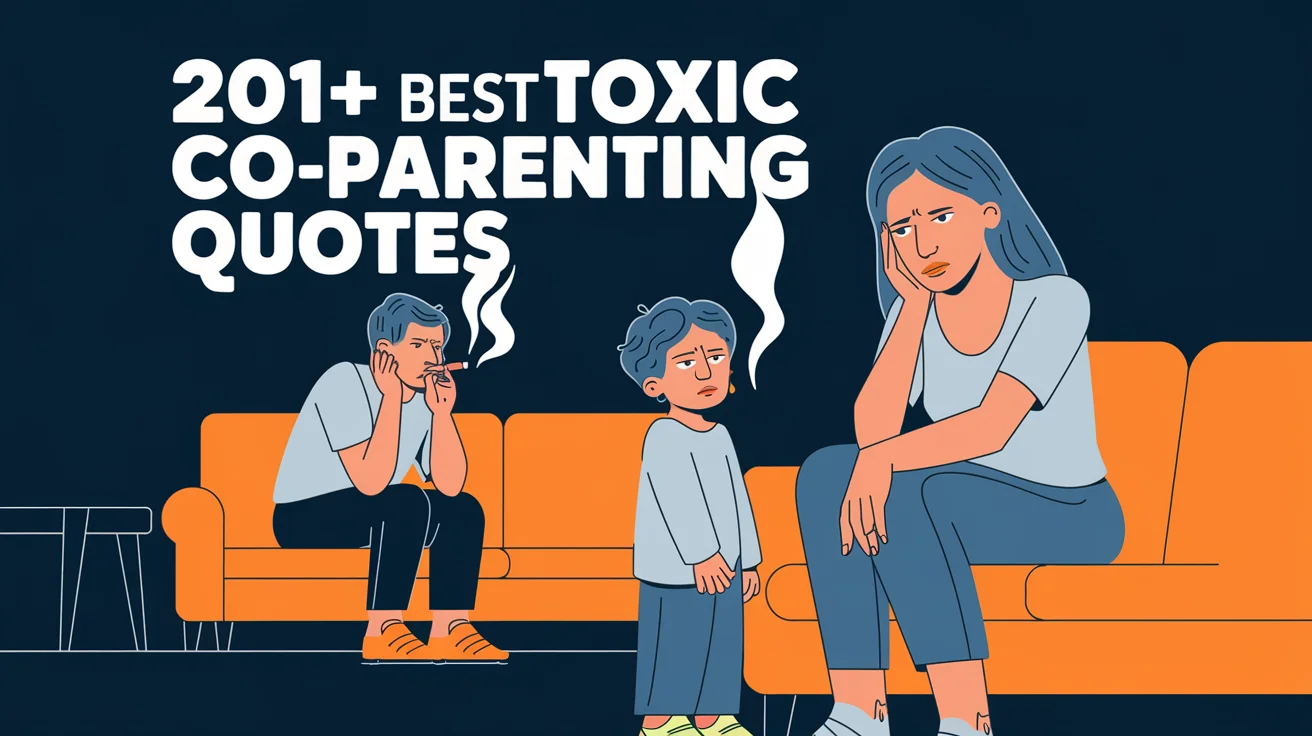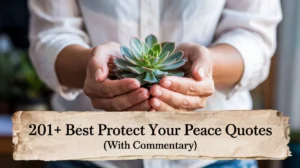Toxic co-parenting can be a significant challenge for those navigating the complexities of raising children after a separation or divorce. It often involves manipulation, control, or lack of communication, leading to stress and emotional strain for both parents and children. These quotes aim to shed light on the struggles of toxic co-parenting, provide comfort, and remind individuals that they are not alone in their journey. Whether you’re in the midst of co-parenting challenges or simply seeking clarity, these quotes will offer insight into how to deal with toxicity in a healthy and constructive manner.
Understanding Toxic Co-Parenting Dynamics
- “Toxic co-parenting isn’t just about poor communication; it’s about creating an environment where negativity thrives.”
- “In toxic co-parenting, the real victim is the child caught in the middle of two conflicting worlds.”
- “When co-parents act from anger or vengeance, the children suffer the most.”
- “Toxicity in co-parenting creates a cycle of chaos, making it harder for everyone to find peace.”
- “The goal in co-parenting should be creating a supportive, stable environment—not winning battles.”
- “Co-parenting isn’t about being right, it’s about doing what’s best for the children.”
- “When co-parents are driven by toxic behaviors, they forget the one thing that matters most—their children.”
- “Toxic co-parenting is like a storm that never ends, destroying everything in its path.”
- “In toxic co-parenting, communication is often weaponized, and cooperation becomes impossible.”
- “Toxic co-parenting is a constant tug-of-war, and the children are the rope.”
- “Healthy co-parenting isn’t about forcing control; it’s about learning how to compromise for the sake of your kids.”
- “A toxic co-parent will never respect boundaries, and a peaceful relationship will be impossible.”
- “In toxic co-parenting, it’s not just the parents who suffer—children carry the weight of the conflict.”
- “Sometimes, the best way to co-parent with a toxic partner is to protect your own peace and set firm boundaries.”
- “Toxic co-parenting isn’t just an inconvenience—it’s a roadblock that can stunt emotional growth for children.”
- “The more toxic the co-parenting relationship, the more important it is to protect your child’s mental health.”
- “A toxic co-parent doesn’t care about the well-being of the child; they care about their own control and power.”
- “A toxic parent may try to undermine your relationship with your child, but always remember, love wins.”
- “Healing from toxic co-parenting begins with accepting that you cannot control the other person—only yourself.”
The Emotional Toll of Toxic Co-Parenting

- “Toxic co-parenting leaves scars that can’t always be seen, but the effects are felt by everyone involved.”
- “Children raised in toxic co-parenting situations often feel like they’re walking on eggshells between two worlds.”
- “The emotional toll of toxic co-parenting is often greater than the physical separation itself.”
- “Toxic co-parenting breeds emotional exhaustion, leaving both parents and children drained.”
- “It’s not easy to keep your cool in the face of toxic co-parenting, but your emotional health must come first.”
- “The more you engage in toxic co-parenting dynamics, the more emotionally disconnected you become from your own well-being.”
- “The silent struggle of co-parenting in a toxic environment is often overlooked, but its impact is deep and long-lasting.”
- “Toxic co-parenting creates a cloud of negativity that affects everyone—especially the children who can feel the tension.”
- “It’s important to heal emotionally before expecting any changes in the toxic co-parenting dynamic.”
- “Co-parenting through manipulation and control can make you feel emotionally trapped, but there is always hope for change.”
- “The emotional toll of toxic co-parenting is often worse than the physical separation. The mental strain never seems to end.”
- “Living with the constant negativity of toxic co-parenting can slowly erode your mental peace.”
- “Co-parenting in a toxic situation often leads to burnout, making it hard to find joy in parenting.”
- “It’s easy to lose sight of your own emotional well-being in toxic co-parenting, but don’t forget to prioritize self-care.”
- “Children may not always express it, but they feel the weight of the emotional toll toxic co-parenting brings.”
- “When both parents are toxic, it’s the children who face the emotional burden, and that’s the real tragedy.”
- “Toxic co-parenting is a constant battle for emotional stability, one that can leave parents feeling helpless.”
- “It’s vital to understand that emotional healing is not only about repairing relationships but also about preserving your own mental health.”
- “Toxic co-parenting can feel like you’re fighting an endless emotional war, but peace begins within yourself.”
The Impact on Children in Toxic Co-Parenting
- “Children of toxic co-parents are the silent victims of emotional manipulation and control.”
- “The damage caused by toxic co-parenting is often invisible, but it affects a child’s emotional development deeply.”
- “A toxic co-parent may never understand that their actions harm the child, not just the other parent.”
- “When co-parents fight, children are the ones who lose, feeling torn between two opposing worlds.”
- “In toxic co-parenting, the child’s well-being takes a back seat to personal grievances and grudges.”
- “Children shouldn’t have to choose between parents, but toxic co-parenting forces them into that painful position.”
- “Toxic co-parenting creates a fragmented sense of security for the child, as they never know what to expect.”
- “Children exposed to toxic co-parenting often internalize the conflict, leading to confusion and emotional distress.”
- “The long-term effects of toxic co-parenting can affect a child’s ability to trust and form healthy relationships in the future.”
- “Toxic co-parents don’t just hurt each other; they hurt their children’s mental and emotional health.”
- “In toxic co-parenting situations, children often feel like they’re responsible for fixing the problems between their parents.”
- “Children deserve peace, but toxic co-parenting strips them of that, leaving them to navigate adult conflicts.”
- “The emotional well-being of children is often overlooked in toxic co-parenting dynamics, but it shouldn’t be.”
- “Children raised in toxic co-parenting environments learn unhealthy patterns of conflict resolution and emotional regulation.”
- “Toxic co-parenting confuses a child’s sense of loyalty, forcing them into an emotional tug-of-war between two parents.”
- “The wounds caused by toxic co-parenting can last a lifetime, affecting how children view relationships and trust.”
- “Children who grow up in toxic co-parenting households often feel insecure, anxious, and uncertain about their future.”
- “Toxic co-parenting teaches children to distrust the concept of love and cooperation, setting them up for future struggles.”
- “When co-parents are toxic, children often feel like they’re carrying the burden of the conflict on their shoulders.”
Setting Boundaries with a Toxic Co-Parent
- “The key to surviving toxic co-parenting is setting clear boundaries and sticking to them, no matter how difficult.”
- “When you co-parent with a toxic person, boundaries are not a luxury—they’re a necessity.”
- “Setting boundaries in a toxic co-parenting situation is not about control; it’s about protecting your peace.”
- “The only way to protect your child from toxic co-parenting is by establishing firm boundaries and maintaining them.”
- “Boundaries with a toxic co-parent aren’t negotiable—they’re essential for preserving your emotional health.”
- “When dealing with a toxic co-parent, remember: no is a complete sentence, and boundaries are non-negotiable.”
- “Toxic co-parents will push against every boundary you set, but your ability to stand firm is key to your peace.”
- “In toxic co-parenting, boundaries don’t just protect you—they protect your children from further emotional harm.”
- “Your boundaries are a shield that blocks the negative influence of a toxic co-parent from seeping into your life.”
- “The moment you set boundaries with a toxic co-parent, you reclaim control over your own peace and sanity.”
- “Toxic co-parents will try to test your limits, but establishing strong boundaries will protect your emotional well-being.”
- “To co-parent successfully with a toxic partner, you must first protect yourself by setting clear and firm boundaries.”
- “Boundaries are not walls—they are simply a way to maintain respect, sanity, and peace in toxic co-parenting.”
- “In toxic co-parenting, setting boundaries is an act of self-respect and love for your children.”
- “A toxic co-parent will never respect your boundaries unless you consistently enforce them with confidence.”
- “Setting boundaries with a toxic co-parent may be challenging, but it’s necessary for both your well-being and your children’s.”
- “If you want to protect your mental and emotional health in toxic co-parenting, boundaries are your best defense.”
- “Toxic co-parents will often try to cross your boundaries, but it’s important to stay strong and assertive.”
- “Boundaries create a space where you can maintain peace, even in the midst of toxic co-parenting.”
The Need for Emotional Detachment in Toxic Co-Parenting
- “Emotional detachment in toxic co-parenting doesn’t mean you don’t care—it means you’re protecting yourself from harm.”
- “The more emotionally detached you are from a toxic co-parent, the easier it is to maintain your peace.”
- “Emotional detachment is one of the most important tools for surviving toxic co-parenting.”
- “In toxic co-parenting, you have to detach emotionally to protect your mental and emotional health.”
- “When dealing with a toxic co-parent, emotional detachment allows you to respond, not react.”
- “Emotional detachment is the only way to prevent toxic co-parenting from draining your emotional reserves.”
- “By detaching emotionally from a toxic co-parent, you protect your children from seeing the emotional chaos unfold.”
- “The goal is not to cut off your emotions, but to control them—emotional detachment helps you do just that.”
- “Emotional detachment in toxic co-parenting allows you to make decisions from a place of clarity rather than frustration.”
- “Toxic co-parenting thrives on emotional chaos, but emotional detachment weakens its hold on your life.”
- “Detaching emotionally from a toxic co-parent doesn’t mean ignoring your child’s needs—it means guarding your heart.”
- “Emotional detachment is a shield you need to protect your own mental and emotional peace in toxic co-parenting.”
- “With emotional detachment, you stop engaging in the toxic dynamics and start focusing on what’s best for your child.”
- “Emotional detachment is key to staying calm and clear-headed in the face of a toxic co-parent’s provocations.”
- “You can love your child without being emotionally entangled in a toxic co-parenting situation.”
- “Emotional detachment allows you to view toxic co-parenting from a place of neutrality, reducing the emotional toll.”
- “In toxic co-parenting, emotional detachment helps you make better decisions, without being swayed by negative emotions.”
- “Detaching emotionally doesn’t mean disconnecting from your child; it means disconnecting from the toxicity of the co-parent.”
- “Emotional detachment gives you the space to heal, reflect, and create a healthier environment for your child.”
Navigating Legal Challenges in Toxic Co-Parenting

- “When toxic co-parenting reaches the courts, it’s no longer just about the children—it’s about proving who’s right.”
- “Legal battles in toxic co-parenting often worsen the conflict, leaving little room for collaboration or resolution.”
- “Sometimes, the only way to protect yourself and your children from toxic co-parenting is through legal intervention.”
- “Legal action in toxic co-parenting cases should be a last resort, but it’s sometimes the only option to safeguard your rights.”
- “Navigating a legal system while co-parenting with a toxic partner can feel like walking through a battlefield.”
- “A toxic co-parent may use the legal system as a weapon to control or manipulate, but don’t let that break your spirit.”
- “The legal process may be long and draining, but it can offer you the protection needed from a toxic co-parent.”
- “When dealing with a toxic co-parent, always document everything—your legal protection starts with solid evidence.”
- “Legal challenges in toxic co-parenting aren’t just about custody—they’re about maintaining stability for your child.”
- “Toxic co-parenting and legal systems don’t mix well, but sometimes a lawyer is the only one who can help you restore peace.”
- “A toxic co-parent will attempt to manipulate the legal system to further their agenda, but stay focused on what matters—your children.”
- “Litigation might provide temporary relief, but the long-term solution is creating boundaries and healing from toxic co-parenting.”
- “Fighting for your rights in a toxic co-parenting situation requires clarity, resilience, and a strong legal strategy.”
- “The legal system can be exhausting in toxic co-parenting cases, but remember, it’s about protecting your child from emotional harm.”
- “In a toxic co-parenting environment, the law might be your only defense, but always remember to put your child’s best interests first.”
- “Legal battles with a toxic co-parent can leave you feeling emotionally drained, but you must stay focused on your child’s well-being.”
- “Winning in court against a toxic co-parent is less important than creating a stable, peaceful home for your child.”
- “When toxic co-parents use the legal system as a tool for control, it’s up to you to stay strong and protect your family’s peace.”
- “The real victory in toxic co-parenting isn’t found in court—it’s in creating a positive, loving environment for your child.”
Coping with the Narcissistic Co-Parent
- “Co-parenting with a narcissist is like playing a game where the rules are constantly changing, and you’re never winning.”
- “A narcissistic co-parent will always make it about them—your needs, your children’s needs, they come second.”
- “In narcissistic co-parenting, the narcissist will turn everything into a power struggle, with little care for the child’s well-being.”
- “To co-parent with a narcissist, you must detach from their emotional games and focus solely on what’s best for your child.”
- “A narcissistic co-parent will try to undermine your authority, but stay firm and consistent in your parenting approach.”
- “In toxic co-parenting with a narcissist, you can’t win by engaging with their manipulations—detachment is key.”
- “The narcissistic co-parent will often use guilt, shame, or emotional manipulation to control the situation, but don’t let them.”
- “With a narcissistic co-parent, setting clear boundaries and enforcing them will be one of your greatest strengths.”
- “A narcissist won’t respect your needs or feelings, but you must respect your own peace and the stability of your children.”
- “When co-parenting with a narcissist, learning to say ‘no’ and stick to your boundaries is essential to preserving your emotional health.”
- “A narcissist wants to create chaos; your job as a co-parent is to remain calm and focused on the child’s well-being.”
- “In a relationship with a narcissistic co-parent, the child’s needs are often disregarded—your job is to protect them from that.”
- “Never let a narcissistic co-parent convince you that their behavior is your fault; the issue lies with their inability to empathize.”
- “Toxic co-parenting with a narcissist may seem impossible, but protecting your child’s emotional health is always worth the fight.”
- “The narcissistic co-parent thrives on control, but by staying calm and unemotional, you can regain a sense of control in your own life.”
- “Remember, the narcissistic co-parent doesn’t change—your approach to dealing with them must remain consistent and strong.”
- “Coping with a narcissistic co-parent means accepting that you can’t control them, but you can control how you respond.”
- “Stay firm in your beliefs, remain emotionally detached, and protect your child’s peace when co-parenting with a narcissist.”
- “Narcissists thrive on emotional reactions—don’t give them the satisfaction of getting a rise out of you in front of your child.”
Maintaining Healthy Boundaries with a Toxic Ex
- “The most powerful tool in toxic co-parenting is maintaining firm, unyielding boundaries.”
- “When your ex is toxic, boundaries are not just helpful—they are essential for your mental health and emotional well-being.”
- “Toxic exes will push boundaries, but if you stay firm and consistent, they will learn to respect them over time.”
- “A toxic ex can only affect you if you let them—set boundaries and protect your peace at all costs.”
- “Maintaining boundaries with a toxic ex is not about punishing them, but about protecting your own happiness and stability.”
- “Boundaries with a toxic ex may not always be respected, but they are necessary for the emotional safety of both you and your children.”
- “Setting boundaries with a toxic ex allows you to regain control of your life and stop the chaos from spilling into your current situation.”
- “A toxic ex will try to push past boundaries—hold your ground for your own emotional well-being and the well-being of your child.”
- “Healthy co-parenting requires boundaries that prioritize your emotional health, not just your ex’s wants or needs.”
- “Your boundaries with a toxic ex are not negotiable—always stand firm in protecting your peace and stability.”
- “Boundaries aren’t about being harsh; they are about creating space for healing and peace in your life post-relationship.”
- “When you have a toxic ex, emotional detachment and firm boundaries are the key to preventing further emotional harm.”
- “A toxic ex will test your boundaries—keep your responses calm, measured, and focused on your emotional health.”
- “The more boundaries you set with a toxic ex, the less room they have to manipulate or create chaos in your life.”
- “Healthy boundaries with a toxic ex create a protective barrier for your children, ensuring they’re not caught in the crossfire.”
- “Establishing boundaries with a toxic ex isn’t selfish—it’s necessary for everyone’s mental and emotional health.”
- “You can still be a kind and compassionate parent while setting clear boundaries with a toxic ex—protect your peace first.”
- “The goal in co-parenting with a toxic ex is not to change them, but to protect your own peace and create stability for your children.”
- “Boundaries with a toxic ex aren’t about controlling them, but about protecting your own heart from further harm.”
Healing from Toxic Co-Parenting
- “Healing from toxic co-parenting is a journey, but it begins by taking control of your own emotional health.”
- “Healing doesn’t mean forgetting the pain, but rather learning how to live beyond it for the sake of your well-being.”
- “The path to healing after toxic co-parenting begins when you let go of the need to control the other person’s behavior.”
- “Healing from toxic co-parenting requires self-compassion and the strength to rebuild your emotional and mental health.”
- “To heal from toxic co-parenting, you must first accept that the other parent may never change—and that’s okay.”
- “Healing takes time, but with each step, you move closer to a healthier co-parenting dynamic for yourself and your children.”
- “The scars of toxic co-parenting will fade when you choose to prioritize your own healing and emotional well-being.”
- “Don’t let the toxicity of the co-parenting relationship define you—healing begins with a commitment to yourself and your children.”
- “Healing from toxic co-parenting is not just about repairing relationships; it’s about reclaiming your peace and happiness.”
- “Focus on the things you can control—your reactions, your boundaries, and your emotional health—this is where true healing begins.”
- “The journey to healing is not linear, but every day you prioritize self-care and peace, you move further away from toxicity.”
- “Healing is a choice you make every day, and it starts with understanding that you are not defined by your toxic co-parent.”
- “Toxic co-parenting may leave scars, but those scars can heal with time, patience, and self-love.”
- “Take the time you need to heal emotionally and mentally—only then can you build the kind of co-parenting relationship you deserve.”
- “Healing means finding the courage to let go of the past, set new boundaries, and create a healthier future for your children.”
- “Healing from toxic co-parenting means learning to forgive—not for the sake of the other parent, but for your own peace.”
- “True healing comes from understanding that the past cannot be changed, but your future can be shaped by the choices you make today.”
- “Healing after toxic co-parenting is not about reconciliation, it’s about finding peace and stability in your own life.”
Strategies for Effective Communication in Toxic Co-Parenting
- “In toxic co-parenting, effective communication isn’t about trying to please the other parent—it’s about staying clear, calm, and concise.”
- “Keep communication with a toxic co-parent strictly business-like—focus on the children’s needs, not personal grievances.”
- “Toxic co-parents thrive on emotional reactions; communicate calmly and avoid getting drawn into their drama.”
- “Use written communication (texts or emails) whenever possible to avoid misunderstandings and protect yourself legally.”
- “When co-parenting with a toxic individual, aim to be direct and unemotional—your goal is to convey facts, not feelings.”
- “Set clear expectations for communication and follow through consistently, regardless of the other parent’s behavior.”
- “Don’t engage in lengthy back-and-forth arguments—respond briefly and stay on point about what’s best for your child.”
- “Respectful communication doesn’t mean agreeing with everything your co-parent says; it means staying focused on what’s best for your child.”
- “Avoid discussing your personal life with a toxic co-parent—keep the conversation centered on your child’s needs and well-being.”
- “Setting communication boundaries with a toxic co-parent is crucial—don’t allow them to pull you into unnecessary conflicts.”
- “Remember that silence is sometimes the most powerful form of communication with a toxic co-parent—don’t feel the need to respond to every provocation.”
- “When co-parenting with someone toxic, always prioritize your child’s needs in your communications, and ignore personal attacks.”
- “Be mindful of how often you communicate with a toxic co-parent—limiting contact can reduce opportunities for manipulation.”
- “You don’t have to engage with every toxic comment—pick your battles and remember your child’s emotional safety comes first.”
- “Setting expectations for how and when you communicate can limit the control a toxic co-parent has over your emotional state.”
- “Stay consistent with your communication style—whether it’s through emails or scheduled phone calls, consistency reduces the emotional toll.”
- “Don’t let a toxic co-parent drag you into unnecessary discussions about the past—focus on moving forward and doing what’s best for your child.”
- “When possible, use a neutral third party (like a co-parenting app) to reduce direct contact and minimize toxicity.”
- “Effective communication in toxic co-parenting means learning to say no, setting limits, and not accepting manipulation or disrespect.”
- “Stay firm in your commitment to healthy communication, no matter how many attempts the toxic co-parent makes to derail it.”
Final Thought
Effective communication is one of the most crucial tools in managing a toxic co-parenting situation. By staying calm, focused, and consistent, you can navigate the complexities of communication without allowing negativity to take over. Remember, your priority is the well-being of your children, not winning an argument or pleasing the other parent.
Through clear boundaries, emotional detachment, and unwavering respect for your child’s needs, you can pave the way for a more peaceful and effective co-parenting relationship.

Anna Grace is a gifted storyteller and the heart behind Quotes Nexus. With a love for weaving words that inspire, comfort, and empower, Anna’s work reflects her deep understanding of human emotions. Her passion lies in creating meaningful quotes that speak directly to the soul, making her a favorite among readers seeking genuine connection.













